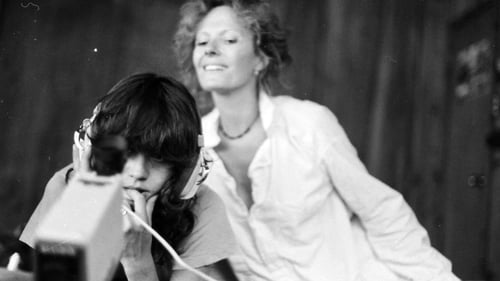Carole Roussopoulos
Рождение : 1945-05-25, Lausanne, Switzerland
Смерть : 2009-10-22

Self (archive footage)
In the 70s, actress Delphine Seyrig and director Carole Roussopoulos, both militant feminists, were the pioneers of video activism in France. They documented the demonstrations of French feminists and used the new technologies to counter the poor representation of women in the public media.

Director
The lesbian community of Geneva wears its name well - Lestime - as an affirmation of pride, openness, and also of strength. This film offers numerous testimonies on being a lesbian today, with Catherine Gaillard's show, Les Amazones, as a common thread. The direct testimonies of those who are in the front line to defend the rights of lesbians, their representativeness, their visibility are their contribution to change mentalities within the family, the school, and the working world, so that lesbians can live without fear.

Director
A documentary about the feminist movement in France and Switzerland in the 1970s, retracing the history, the struggles, the achievements, and the upheavals.

Director
Four women: Claudine, Emmanuelle, Monique and Anne testify to the rapes committed by their father or grandfather during their childhood. These women of different ages and social backgrounds meet each week as part of the rape women Information group.

Director
The film presents a series of portraits of women working in traditional male jobs in the transport industry: the SNCF, the RATP, Air France and Air Inter, and at Paris airports. Each woman talks about her professional choice, her training, what responsibilities she holds, where she fits within the company, and her work relationships. They all underline the need to be organised to manage personal and professional lives, and the growing number of women who choose these jobs. They are on the whole positive and their views often inspiring.

Director
At the fishing port of Lorient in Brittany, nearly 800 women work, filleters by day, fish sorters by night. Some testify to the conditions in which they exercise their profession, conditions almost unchanged for fifty years: in the cold, humidity and ice, standing, carrying heavy loads, and always without status.

Director
Shellfish harvesters from the Marennes-Oléron basin (Charente-Maritime) testify to their living and working conditions: difficulties in the profession, distribution of tasks between men and women, advantages of co-detention, creation of an association to end their isolation and improve their status. Interviews and scenes of work at sea and at the "cabin" help to paint a moving portrait of courageous and energetic women.

Director of Photography
The film is a series of interviews with various well-known film actresses, including Jenny Agutter, Maria Schneider, and Jane Fonda. The title, which is borrowed from a 1958 film with the same name by Marc Allegret, refers to the sense the actresses have of what is expected of them by the film industry.

Editor
The film is a series of interviews with various well-known film actresses, including Jenny Agutter, Maria Schneider, and Jane Fonda. The title, which is borrowed from a 1958 film with the same name by Marc Allegret, refers to the sense the actresses have of what is expected of them by the film industry.

Director
Document on the struggle of immigrant workers on strike for rent in Sonacotra homes with the support, in terms of legal defense, of Jacques Verges, lawyer, and judge Bidalou.

Director
In two parts, it documents the litigation of Brigitte Fontaine, Monique Piton, Mireille and Erin Pizzey with Éditions de femmes in 1976 and those of Catherine Leguay and Brigitte Fontaine in 1977.

Director
A couple working at Lip: she is a semi-skilled worker, he is head of production line. They discuss the problems regarding the women's situation, their working conditions, and internal democracy within the union. Charles Piaget gives his point of view, at a screening organised at the factory, about what Jacqueline and Marcel have said.

Director
Monique (an advertising assistant) and Christine (a semi-skilled worker) talk about how difficult it is for a woman working in a struggling factory (Lip), about issues of internal democracy within the trade union and the end of work in the current situation.

Director
Delphine Seyrig reads passages from a Valerie Solanas’s SCUM manifesto.

Director
A young woman talks about the "Young Lord", the Puerto Ricans who are living in the United States but do not have the necessary diploma to find work. The movie tracks back the story of the movement, born in 1969. Inspired by the american black fights, it is at first a very political movement. it gets more social around 1970. The movie makes us discover a place of refuge for the junkies. They talk about the difficult life conditions of the minorities, about drogue problems and about the initiatives that are meant to help them. They denounce a governmental plan which is supposed to get ride of the blacks and Puerto Ricans by using drogues: the methadone substitution program, legal and provided by the government, holds the junkies into a mental slavery, which drives them to their death. They also talk about the whole propaganda system and the mental conditioning of society.

Cinematography
In "Messe pour un corps", Michel Journiac organizes a real religious service and makes the participants receive communion with a black pudding made from his own blood.

Director
Documentary about the Lyon sex workers who occupied the church of St. Nizier on June 3, 1975.

Director
The year 1975 is declared “year of the woman”. On this occasion Bernard Pivot invited Françoise Giroud on television, then Secretary of State for Women. Faced with statements, a group of women filmmakers parody the issues in a provocative way.

Director
This documentary is about the solidarity march supporting the workers on strike at Lip (September 1973). Strikers, including Charles Piaget, talk about the action committee and its relationship to the union structure. Images of the march alternate with shots taken at various meetings.

Director
August 1973, after the police move into the Lip factory in Besançon, one of the female workers, Monique Piton, talks about the four months of struggle, the place of women and the lessons she has learnt. She is also critical of the role of television.

Director
In September 1972, a Palestinian commando called the Black September took the Israeli delegation hostage at the Munich Olympics. This film, which denounces the hypocrisy of this illusory "Olympic peace", is a montage of images from official television and images filmed in the Palestinian refugee camps of Jordan in September 1971 (Black September), in full repression of the Palestinian people by the armies of King Hussein.

Director

Director
Gabrielle Nanchen, the first Swiss woman socialist deputy to the National Council is interviewed on the very day that women obtain the right to vote in Switzerland and in her canton, Valais. The film also collects the reactions of the Valais peasants.

Editor
Demonstration by FHAR, the Homosexual Revolutionary Action Front, the 1st of May 1971. People discuss at the University of Vincennes and show a common determination to break prejudice and open minds. They refuse to hide anymore, and talk about this revolution of desire.

Sound
Demonstration by FHAR, the Homosexual Revolutionary Action Front, the 1st of May 1971. People discuss at the University of Vincennes and show a common determination to break prejudice and open minds. They refuse to hide anymore, and talk about this revolution of desire.

Director of Photography
Demonstration by FHAR, the Homosexual Revolutionary Action Front, the 1st of May 1971. People discuss at the University of Vincennes and show a common determination to break prejudice and open minds. They refuse to hide anymore, and talk about this revolution of desire.

Director
Documentary about the practice of abortion in France in the early seventies, at a time when it was still illegal.

Director
Demonstration by FHAR, the Homosexual Revolutionary Action Front, the 1st of May 1971. People discuss at the University of Vincennes and show a common determination to break prejudice and open minds. They refuse to hide anymore, and talk about this revolution of desire.

Director
In the aftermath of the arrest of Angela Davis, Jean Genet reads a text denouncing racist US policy, supporting the Black Panthers party and Angela Davis for a television show that will be completely censored.

























